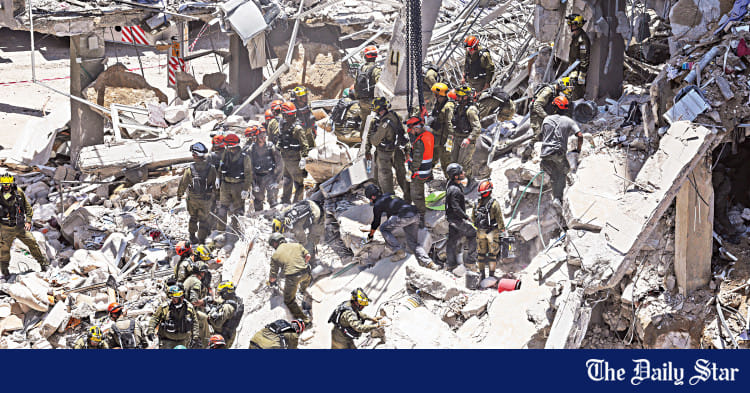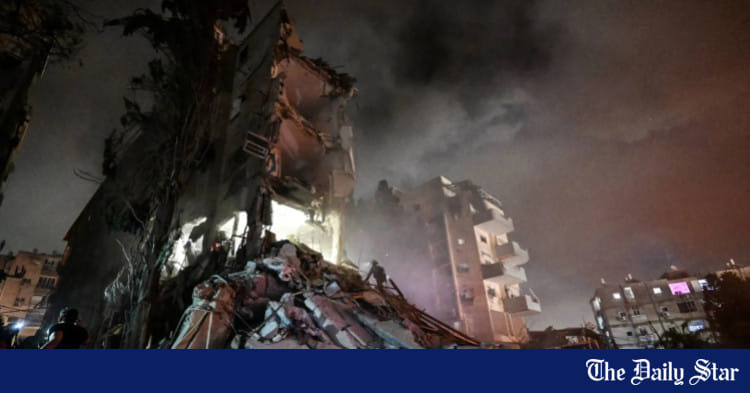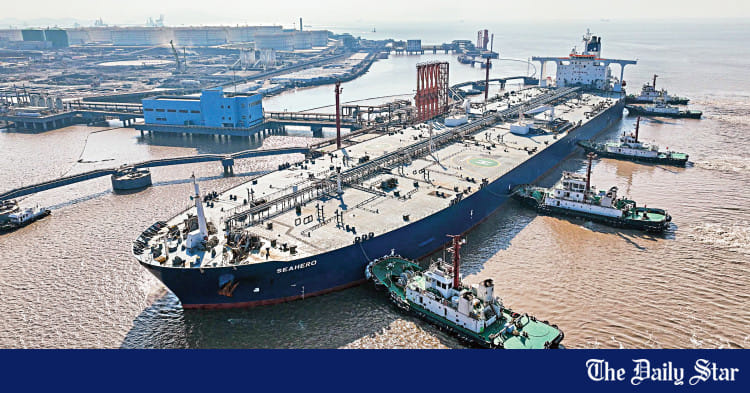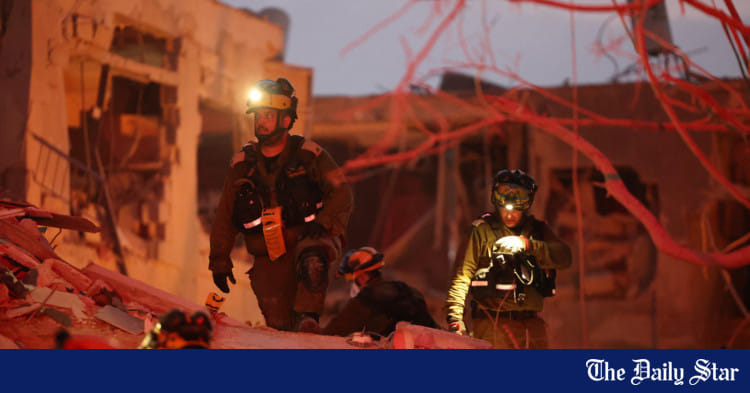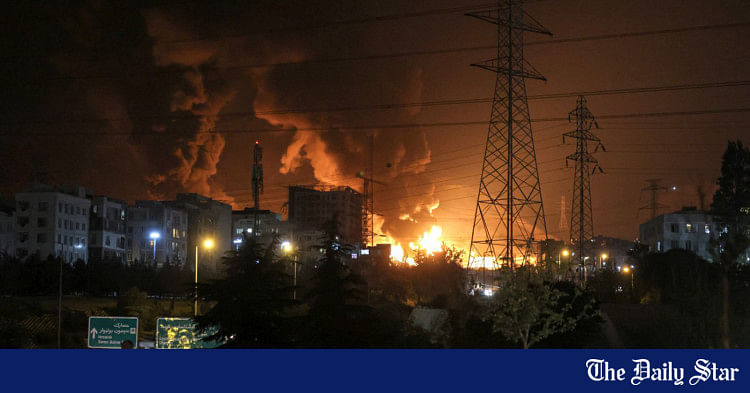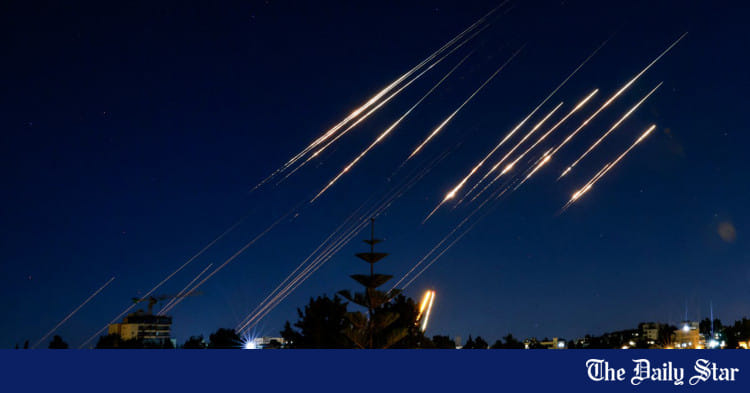Saif
Senior Member
- Joined
- Jan 24, 2024
- Messages
- 16,471
- Likes
- 8,138
- Nation

- Residence

- Axis Group


Ending hostilities in Middle East
The dangerous escalation in the Middle Eastern conflict with Israel's decapitation campaign against Iran's senior military leaders, nuclear scientists and attacks on the country's military and nuclear research facilities in the wee hours of Friday (June 13) followed by Iran's launching a retaliator
Ending hostilities in Middle East
SYED FATTAHUL ALIM
Published :
Jun 16, 2025 00:15
Updated :
Jun 16, 2025 00:15

The dangerous escalation in the Middle Eastern conflict with Israel's decapitation campaign against Iran's senior military leaders, nuclear scientists and attacks on the country's military and nuclear research facilities in the wee hours of Friday (June 13) followed by Iran's launching a retaliatory missile barrage on Israel have shocked the world. Though the two countries have been on a confrontational course since long, the last Friday's attack and counterattacks have taken an existential turn. And as one fourth of the world's fuel oil and one third of liquefied natural gas (LNG) pass through the Strait of Hormuz that connects Persian Gulf to the open ocean, the consequences of any full-blown conflagration between the two countries has the potential to disrupt the flow of critical fossil energy to the rest of the world. The world market has already reacted nervously to the conflict by hiking up oil prices to as much as 13 per cent to their highest level since January.
It reminds us the disruptions in global supply chain following the start of Russia's Special Military Operation (SMO) against Ukraine in March 2022. The oil and food prices surged globally. The ongoing attacks and counterattacks between Iran and Israel have already sent the energy market reeling from its impact. So far, neither party in the conflict has caused any severe disruption to the flow of oil and LNG through the Strait of Hormuz. But if Iran chooses to make good on its threat to block the Strait of Hormuz in case Israel continues with its air attacks on Iranian cities including energy infrastructures, then that would be a very bad news for the global oil market. Worse yet, any false flag attack on the oil facilities of the Gulf countries would not only cause the entire Middle East to get embroiled in a wider regional war, it might also finally draw the United States and its European NATO allies into the war both to protect Israel and the oil infrastructures in the region. And one cannot also rule out the ultimate involvement of other world powers including Russia and China in the conflict. For Russia has a long-term defense partnership with Iran, while China depends heavily on the smooth supply of Iranian oil. In that case, unless serious diplomatic efforts are started by the United Nations supported by the major world powers, the ongoing conflict between Iran and Israel may spin out of control.
However, any talk of restraint or de-escalation as being advised by UN or some of the world powers following escalation of the conflict through Israel's unilateral attack on Iran in the morning of Friday (June 13) hardly carry any meaning. For a mutually agreed cessation of hostilities largely depends on the mutual understanding that both parties would respect the conditions of a possible ceasefire. But so far as the history of past conflicts in the region goes, Israel's record of honouring the conditions of any ceasefire is poor. So, the question of trust between the warring parties is crucial at this point. And that is more so when the declared objective of Israel is destruction of Iran's nuclear ambition, if any, and its military capabilities including regime change (in Iran). Clearly, it has become a do-or-die battle for existence for either side in the conflict.
Most Importantly, who is going to broker any such peace deal between Iran and Israel? The US and the European powers are known for their exceptional bias towards one party, Israel to be specific. So, Iran may not accept their role as a credible peacemaker. The other powers including Russia and China would be looked upon with suspicion by European powers. The UN, on the other hand, has proved to be a toothless organization when it comes to implementation of any peace deal, even if there is no shortage of goodwill on the part of an incumbent UN Secretary-General to broker genuine peace. And the 15-member UN Security Council, which has the power to enforce peace treaties that are binding on the parties in any conflict concerned, often cannot reach a consensus on issues arising in the major flash points of conflict in the world, thanks to the veto power that its five permanent members enjoy. And the Middle East is one special case where the big powers including the US, the UK, France, Russia and China could never see eye to with one another to reach any meaningful settlement. So, it is ultimately the balance of powers in the region that would determine the fate of any settlement if ever reached in the Middle East.
Despite such portrayal of a bleak prospect of peace in the Middle East, there is urgency to stop an all-out existential war between Iran and Israel. Even if US and its NATO allies weigh in on behalf of Israel in the raging conflict, that, too, won't be able to end the war shortly. The recent wars in Afghanistan and Iraq or the Vietnam war of the 60s and 70s of the last century have proved beyond doubt that even an overwhelming advantage of firepower on one side cannot guarantee its victory. So, any idea of ending the war by tilting the balance of power on one side would be foolhardy. Any nuclear strike on Iran that many fear Israel may resort to if it finds itself in a tight corner in any critical stage of the conflict, that would be the end of everything. In that case, everyone loses as the oil fields of the entire region would be consumed by the conflagration. It is going to be an unwinnable war. And to avoid an endgame that assures mutual annihilation, the big powers will be required to keep their cool, forget about any biases at least for the moment and try earnestly to work out a settlement to cease hostilities between Iran and Israel. Or they can also sincerely empower the UN to do the job promising non-interference in its work (of making peace).
Otherwise, the fallout will prove to be disastrous for everyone, especially the world economy.
SYED FATTAHUL ALIM
Published :
Jun 16, 2025 00:15
Updated :
Jun 16, 2025 00:15
The dangerous escalation in the Middle Eastern conflict with Israel's decapitation campaign against Iran's senior military leaders, nuclear scientists and attacks on the country's military and nuclear research facilities in the wee hours of Friday (June 13) followed by Iran's launching a retaliatory missile barrage on Israel have shocked the world. Though the two countries have been on a confrontational course since long, the last Friday's attack and counterattacks have taken an existential turn. And as one fourth of the world's fuel oil and one third of liquefied natural gas (LNG) pass through the Strait of Hormuz that connects Persian Gulf to the open ocean, the consequences of any full-blown conflagration between the two countries has the potential to disrupt the flow of critical fossil energy to the rest of the world. The world market has already reacted nervously to the conflict by hiking up oil prices to as much as 13 per cent to their highest level since January.
It reminds us the disruptions in global supply chain following the start of Russia's Special Military Operation (SMO) against Ukraine in March 2022. The oil and food prices surged globally. The ongoing attacks and counterattacks between Iran and Israel have already sent the energy market reeling from its impact. So far, neither party in the conflict has caused any severe disruption to the flow of oil and LNG through the Strait of Hormuz. But if Iran chooses to make good on its threat to block the Strait of Hormuz in case Israel continues with its air attacks on Iranian cities including energy infrastructures, then that would be a very bad news for the global oil market. Worse yet, any false flag attack on the oil facilities of the Gulf countries would not only cause the entire Middle East to get embroiled in a wider regional war, it might also finally draw the United States and its European NATO allies into the war both to protect Israel and the oil infrastructures in the region. And one cannot also rule out the ultimate involvement of other world powers including Russia and China in the conflict. For Russia has a long-term defense partnership with Iran, while China depends heavily on the smooth supply of Iranian oil. In that case, unless serious diplomatic efforts are started by the United Nations supported by the major world powers, the ongoing conflict between Iran and Israel may spin out of control.
However, any talk of restraint or de-escalation as being advised by UN or some of the world powers following escalation of the conflict through Israel's unilateral attack on Iran in the morning of Friday (June 13) hardly carry any meaning. For a mutually agreed cessation of hostilities largely depends on the mutual understanding that both parties would respect the conditions of a possible ceasefire. But so far as the history of past conflicts in the region goes, Israel's record of honouring the conditions of any ceasefire is poor. So, the question of trust between the warring parties is crucial at this point. And that is more so when the declared objective of Israel is destruction of Iran's nuclear ambition, if any, and its military capabilities including regime change (in Iran). Clearly, it has become a do-or-die battle for existence for either side in the conflict.
Most Importantly, who is going to broker any such peace deal between Iran and Israel? The US and the European powers are known for their exceptional bias towards one party, Israel to be specific. So, Iran may not accept their role as a credible peacemaker. The other powers including Russia and China would be looked upon with suspicion by European powers. The UN, on the other hand, has proved to be a toothless organization when it comes to implementation of any peace deal, even if there is no shortage of goodwill on the part of an incumbent UN Secretary-General to broker genuine peace. And the 15-member UN Security Council, which has the power to enforce peace treaties that are binding on the parties in any conflict concerned, often cannot reach a consensus on issues arising in the major flash points of conflict in the world, thanks to the veto power that its five permanent members enjoy. And the Middle East is one special case where the big powers including the US, the UK, France, Russia and China could never see eye to with one another to reach any meaningful settlement. So, it is ultimately the balance of powers in the region that would determine the fate of any settlement if ever reached in the Middle East.
Despite such portrayal of a bleak prospect of peace in the Middle East, there is urgency to stop an all-out existential war between Iran and Israel. Even if US and its NATO allies weigh in on behalf of Israel in the raging conflict, that, too, won't be able to end the war shortly. The recent wars in Afghanistan and Iraq or the Vietnam war of the 60s and 70s of the last century have proved beyond doubt that even an overwhelming advantage of firepower on one side cannot guarantee its victory. So, any idea of ending the war by tilting the balance of power on one side would be foolhardy. Any nuclear strike on Iran that many fear Israel may resort to if it finds itself in a tight corner in any critical stage of the conflict, that would be the end of everything. In that case, everyone loses as the oil fields of the entire region would be consumed by the conflagration. It is going to be an unwinnable war. And to avoid an endgame that assures mutual annihilation, the big powers will be required to keep their cool, forget about any biases at least for the moment and try earnestly to work out a settlement to cease hostilities between Iran and Israel. Or they can also sincerely empower the UN to do the job promising non-interference in its work (of making peace).
Otherwise, the fallout will prove to be disastrous for everyone, especially the world economy.

 War Archive
War Archive






